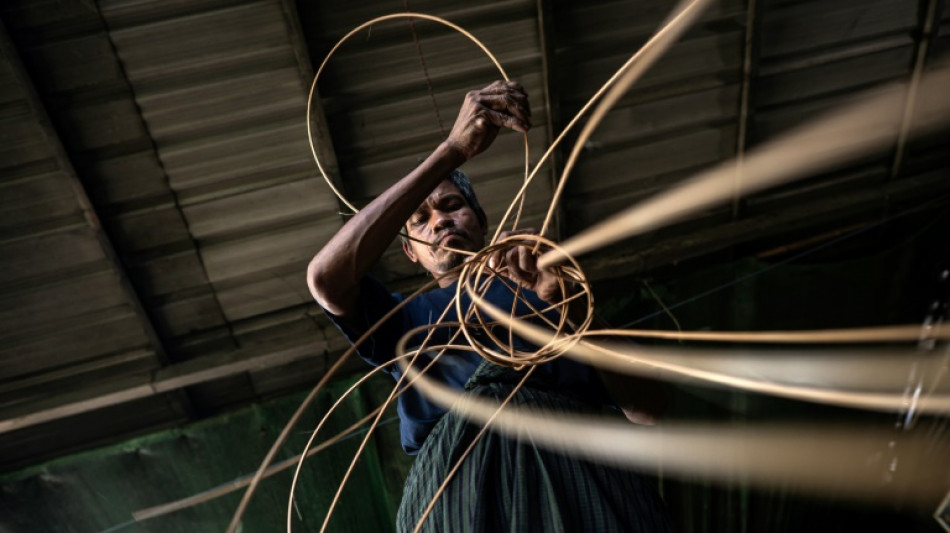
-
 North Korea's Kim vows 'unconditional support' for Russia's war in Ukraine
North Korea's Kim vows 'unconditional support' for Russia's war in Ukraine
-
Starbase city grows near Musk's launch site and wilderness refuges

-
 More people leave homes in Canada as huge wildfires spread
More people leave homes in Canada as huge wildfires spread
-
US-backed group extends closure of Gaza aid sites

-
 Trump slaps new travel ban on 12 countries
Trump slaps new travel ban on 12 countries
-
'I am a political prisoner' says detained Salvadoran activist

-
 Trump orders inquiry into 'conspiracy' to hide Biden's health decline
Trump orders inquiry into 'conspiracy' to hide Biden's health decline
-
Hobson blazes to 200m free victory at US Swim Championships
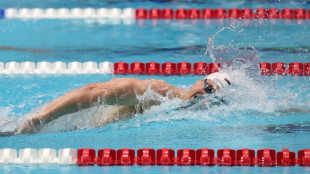
-
 Trump signs travel ban on 12 countries after Colorado attack
Trump signs travel ban on 12 countries after Colorado attack
-
A lingering Musk: Will ex-aide Elon get up Trump's nose?

-
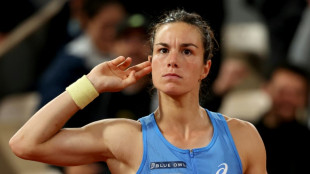 Who said what: French Open day 11
Who said what: French Open day 11
-
Djokovic downs Zverev to set up French Open semi clash with Sinner
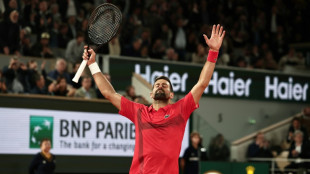
-
 Pledge to protect oceans falling billions short: report
Pledge to protect oceans falling billions short: report
-
Silver says 2026 NBA All-Star game to have USA v World format

-
 Portugal praise veteran Ronaldo's 'hunger' after Nations League win
Portugal praise veteran Ronaldo's 'hunger' after Nations League win
-
Pacers' Haliburton relishes NBA title shot against dominant Thunder

-
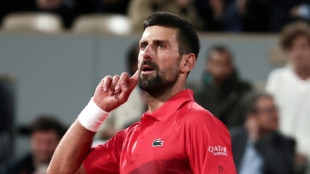 Djokovic beats Zverev after Boisson lights up French Open
Djokovic beats Zverev after Boisson lights up French Open
-
Djokovic downs Zverev to reach French Open semis
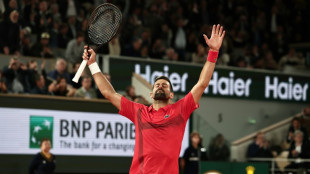
-
 'No means no' prosecutor tells jurors as Harvey Weinstein trial wraps
'No means no' prosecutor tells jurors as Harvey Weinstein trial wraps
-
Witness testifies Sean Combs dangled her from balcony

-
 Trump says Putin plans to retaliate for Ukraine attack on bombers
Trump says Putin plans to retaliate for Ukraine attack on bombers
-
Reddit sues AI giant Anthropic over content use

-
 Thunder's Gilgeous-Alexander hungry to cap MVP season with NBA crown
Thunder's Gilgeous-Alexander hungry to cap MVP season with NBA crown
-
Ronaldo breaks Germany jinx as Portugal reach Nations League final

-
 Anger as US blocks Gaza ceasefire resolution at UN Security Council
Anger as US blocks Gaza ceasefire resolution at UN Security Council
-
Does Brazilian funk glorify crime? Singer's arrest triggers debate

-
 Scientists, doctors, disabled join Argentine pensioners' march
Scientists, doctors, disabled join Argentine pensioners' march
-
Europe suffers its largest diphtheria outbreak in 70 years

-
 Swiss probe intelligence leaks to Russia
Swiss probe intelligence leaks to Russia
-
Boisson joins select group of surprise Grand Slam semi-finalists
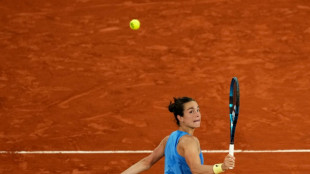
-
 US blocks Gaza ceasefire resolution at UN Security Council
US blocks Gaza ceasefire resolution at UN Security Council
-
Chelsea win race to sign Ipswich striker Delap

-
 Canada steelworkers urge Ottawa to counter Trump
Canada steelworkers urge Ottawa to counter Trump
-
Detained Salvadoran activist says she won't be silenced

-
 Syria says Israeli strikes 'aimed at undermining' progress, stability
Syria says Israeli strikes 'aimed at undermining' progress, stability
-
Cuban students call boycott over mobile tariff hikes

-
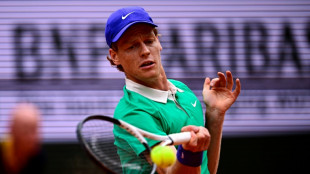 Sinner says childhood acquaintance Boisson 'deserves' fairytale French Open run
Sinner says childhood acquaintance Boisson 'deserves' fairytale French Open run
-
Brazil's top court tackles social media regulation

-
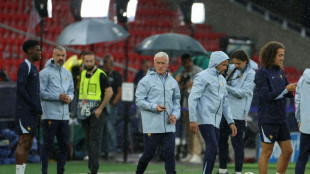 Deschamps banking on France depth against 'best in the world' Spain
Deschamps banking on France depth against 'best in the world' Spain
-
13 on trial in France over 'racist' stunt against Olympics singer

-
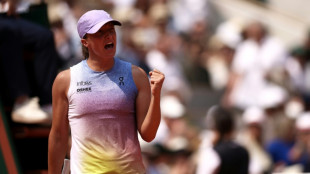 Swiatek faces Sabalenka in blockbuster French Open semi-final
Swiatek faces Sabalenka in blockbuster French Open semi-final
-
Trump says Putin plans to retaliate after Ukraine drone strikes

-
 McIlroy explains media silence after driver ban
McIlroy explains media silence after driver ban
-
Trump says Iran 'slowwalking' as Khamenei opposes nuclear proposal

-
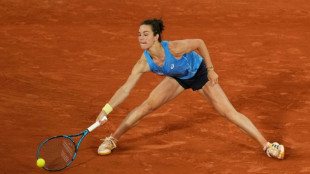 Boisson 'going for the dream' at French Open after injury nightmare
Boisson 'going for the dream' at French Open after injury nightmare
-
Trump talks with Putin on Ukraine, Iran

-
 Bulgaria on course to become 21st EU member to adopt euro
Bulgaria on course to become 21st EU member to adopt euro
-
Deadly stampede at India cricket celebrations leaves 11 dead

-
 Paris seeks personhood status for River Seine
Paris seeks personhood status for River Seine
-
Sensational Boisson lights up French Open, Sinner reaches semi-finals
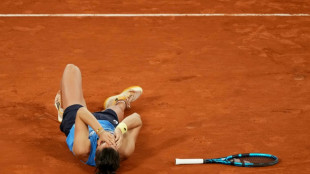

Ancient Myanmar ball game battles for survival in troubled nation
Mastering control of the rising and falling rattan chinlone ball teaches patience, says a veteran of the traditional Myanmar sport -- a quality dearly needed in the long-suffering nation.
"Once you get into playing the game you forget everything," says 74-year-old Win Tint.
"You concentrate only on your touch and you concentrate only on your style."
Chinlone is Myanmar's national game and dates back centuries. Branded a blend of sport and art, it is often played to music, and is typically practised differently by men and women.
Male teams in skimpy shorts stand in a circle using stylised strokes of their feet, knees and heads to pass the ball in a game of "keepy-uppy", with a scoring system impenetrable to outsiders.
Women play solo like circus performers -- kicking the ball tens of thousands of times per session while walking tightropes, twirling umbrellas and perching on chairs balanced atop beer bottles.
Teen prodigy Phyu Sin Phyo hones her skills at the court in Yangon, toe-bouncing a burning ball while spinning a hula-hoop -- also on fire.
"I play even when I am sick," says the 16-year-old. "It is important to be patient to become a good chinlone player."
But play has plunged in recent years, with the Covid-19 pandemic followed by the 2021 military coup and subsequent civil war.
Poverty rates are shooting up and craftsmen face increasing problems sourcing materials to make balls.
But the rising and falling rhythm of the game offers its practitioners a respite.
"When you hear the sound of kicking the ball it's like music," Win Tint, vice-chairman of the Myanmar Chinlone Federation, told AFP.
"So when you play chinlone, you feel like dancing."
- 'Play day is happy' -
Different versions of the hands-free sport known as "caneball" are widely played across Southeast Asia.
In Thailand, Malaysia and Indonesia players kick and head the ball over a net in the volleyball-style "sepak takraw".
In Laos it is known as "kataw" while Filipinos play "sipa" -- meaning kick.
Myanmar's iteration dates back 1,500 years, according to popular belief.
Some cite a French archaeologist's discovery of a replica silver chinlone ball at a pagoda built in the Pyu era of 200 BC to 900 AD.
It was initially practised as a casual pastime, a fitness activity and for royal entertainment.
But in 1953 the game was given rules and a scoring system, as part of an effort to codify Myanmar's national culture after independence from Britain.
"No one else will preserve Myanmar's traditional heritage unless the Myanmar people do it," said player Min Naing, 42.
Despite the conflict, players still gather under motorway overpasses, around street lamps blighted with wartime blackouts and on dedicated chinlone courts -- often ramshackle open-sided metal sheds with concrete floors.
"For a chinlone man, the day he plays is always a happy day. I am happy, and I sleep well at night," says Min Naing.
"On the days I don't play it, I feel I am missing something."
- 'Respect the chinlone' -
But Win Tint is concerned that participation rates are falling.
"I worry about this sport disappearing," says master chinlone ball maker Pe Thein, toiling in a sweltering workshop in Hinthada, 110 kilometres (70 miles) northwest of Yangon.
"That's the reason we are passing it on through our handiwork."
Cross-legged men shave cane into strips, curve them with a hand crank and deftly weave them into a melon-sized ball with pentagonal holes, boiled in a vat of water to seal its strength.
"We check our chinlone's quality as if we're checking diamonds or gemstones," adds the 64-year-old Pe Thein.
"As we respect the chinlone, it respects us back."
Each ball takes around two hours to make and earns business-owner Maung Kaw $2.40 apiece.
But supplies of the best-quality rattan he covets from nearby Rakhine are dwindling.
There is fierce fighting in the state between the military and opposition groups that now control almost all of it.
Farmers are too fearful to plunge into the jungle battleground to cut cane, says Maung Kaw, endangering his profession.
"It should not be that we have players but no chinlone makers," says the 72-year-old.
"I want to work as well as I can for as long as I can."
F.Pedersen--AMWN